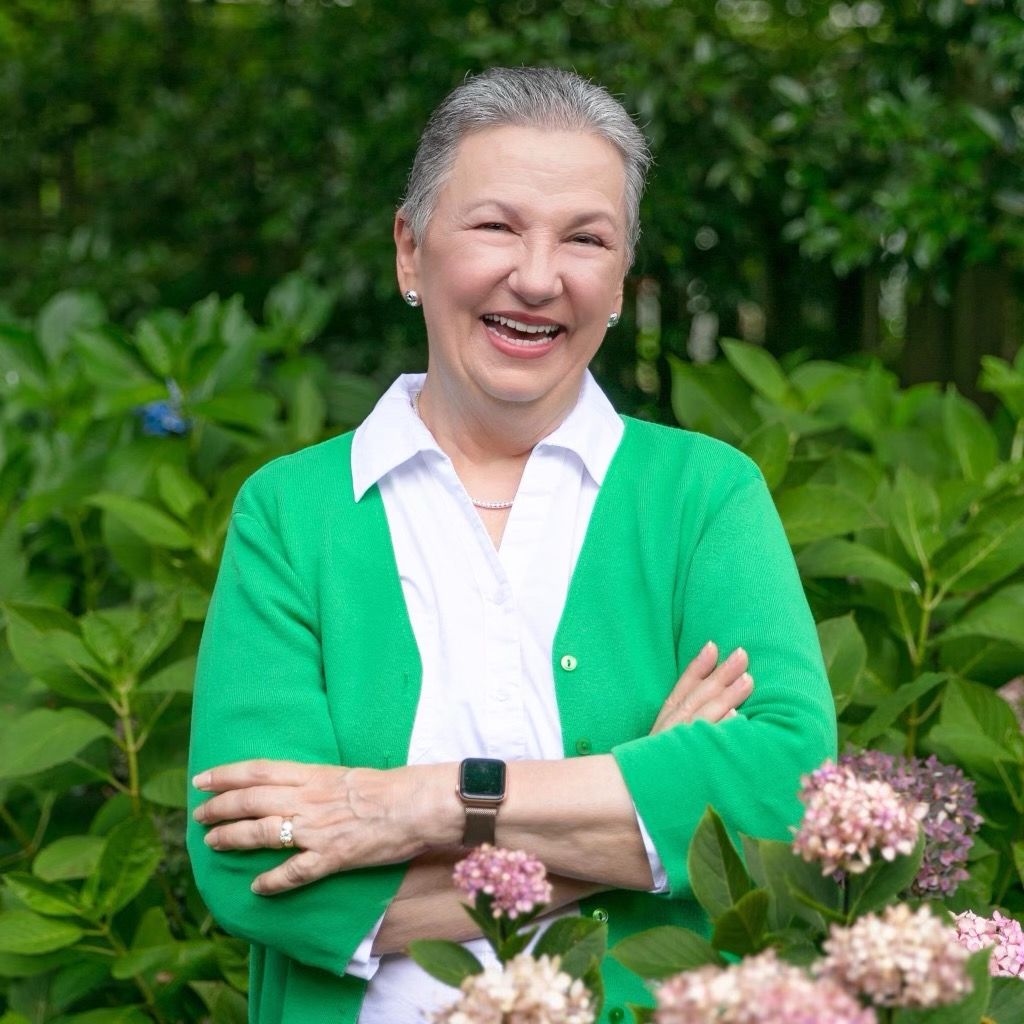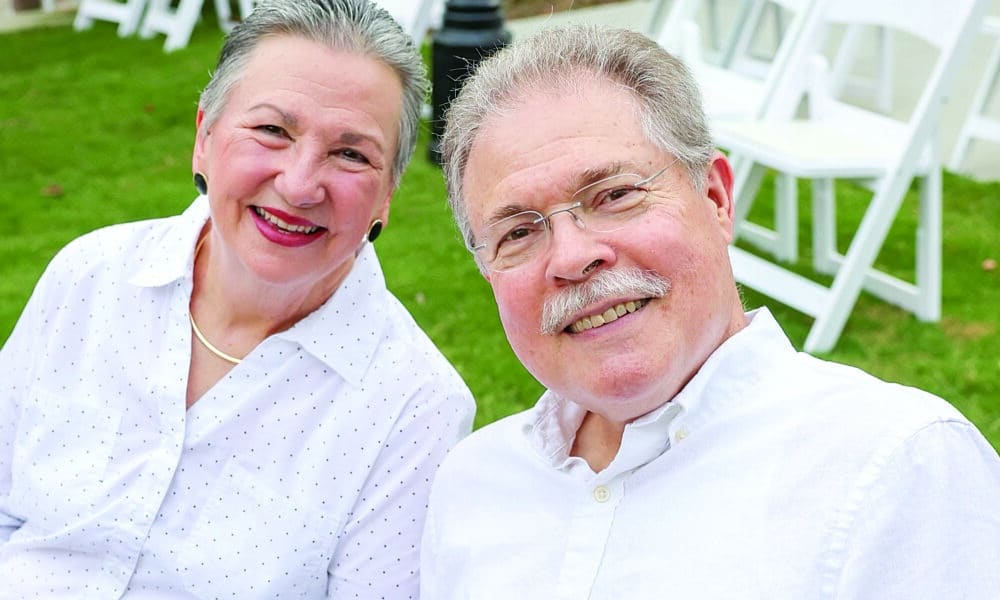Community
Good Grief: Life After Loss
Published
2 years agoon
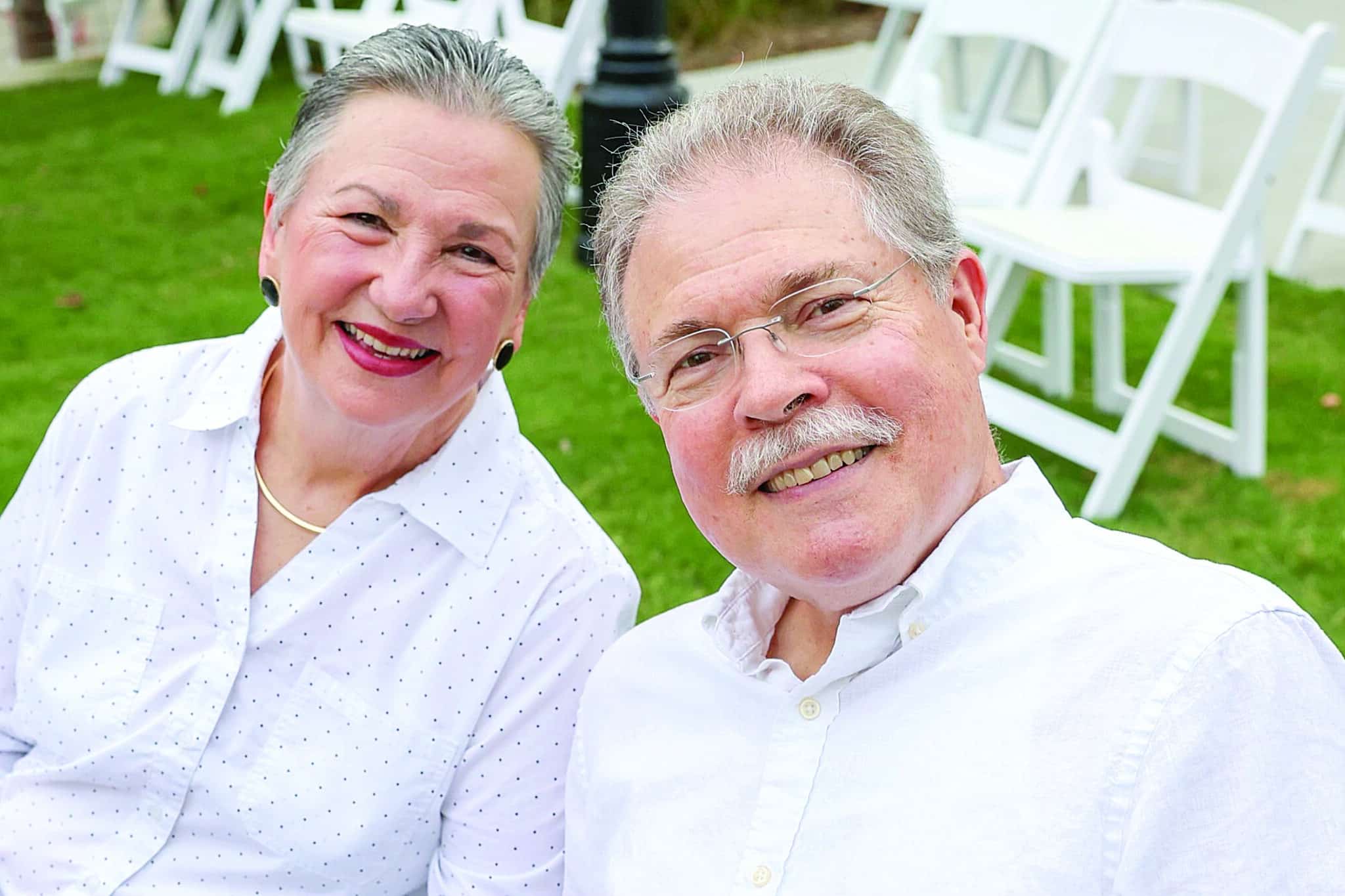
Part 1 of 2
As weighty a topic as grief can be, I felt compelled to address it as we approach National Grief Awareness Day on August 30. I wanted to provide support to those who are weathering losses. Even when life delivers one of its most powerful blows, we can share in the certainty that we will regain our equilibrium.
Opening up a space to discuss bereavement has been cathartic for contributors sharing their stories and will be for those who read them. Talking about loss is healing, even as tears are choked back at times. For readers enduring their own losses, there is comfort in the simple reassurance that we’re not alone.
Grief is unavoidable; it’s part and parcel of the human condition, the inevitable equalizer across the board in the game of life. We’re all bound to experience the tragedy and melancholy of having lost loved ones and tasked with picking up the remaining pieces of our lives to continue our journey without them.
How we deal with grief depends in large part on our personality and the relationship we had with the deceased. Thus, the process is singular to each of us. There can be no one-size-fits-all type of guide.
Losing a spouse can leave one person feeling shattered while another may face the same loss without much incident. The loss of a parent can result in one sibling handling it more easily than another, although they’ve lost the same person.
Neither reaction is right or wrong. Grief is as individual as our fingerprints. No two people will move through it in the same way.
Consider this two-part article an invitation to give yourself grace while navigating the harrowing journey through loss. Provided no one is being harmed, it’s important to recognize first and foremost that all grief is “good grief.”
Get by with a little help from your friends – and a professional
When it comes to death, as prevalent as it is, we can all be pretty terrible at dealing with it, whether we’re experiencing the loss or trying to comfort someone else. Advice from a pro can go a long way when we don’t know the best things to say or do.
To that end, Danielle Edwards, MSW, LCSW, of Edwards Psychotherapy and Consulting LLC, a grief, trauma and domestic violence recovery therapist, was kind enough to share her expertise.
First and foremost, Edwards advises any bereaved individuals struggling with thoughts of suicide to call or text 988, the Suicide and Crisis Lifeline, or to go to the nearest ER.
“Denial, Anger, Bargaining, Depression, Acceptance — the stages of grief. I don’t use them. There’s this idea that you’re supposed to move through denial, anger and once you hit acceptance, you can tie it all up and put it on a shelf. But it’s not a linear process,” Edwards said.
She advises people that they should eliminate any expectation that they should be further along. “There’s nothing wrong with you, you’re not off track, your journey may be riddled with detours and U-turns. Expect a slew of other pit-stops along the way like remorse and relief, that can also be part of your experience,” she added.
Mayor of Peachtree Corners, Mike Mason
Toiling in the garden, Peachtree Corners Mayor Mike Mason paused to survey his work and asked aloud, although he’s alone, “Well honey, what do you think? How does that look?” Having lost his beloved wife of 49 years this past January to an aggressive form of uterine cancer, he is left to only hope the late first lady of the city, Debbie Mason, would approve.
Maintaining their beautiful garden is a labor of love and one way Mason honors his late wife. “We created a habitat in our backyard for birds, squirrels, pollinators and predators. From the sunroom, you can appreciate the color palette and shapes of the pots and flowers,” Mason said.
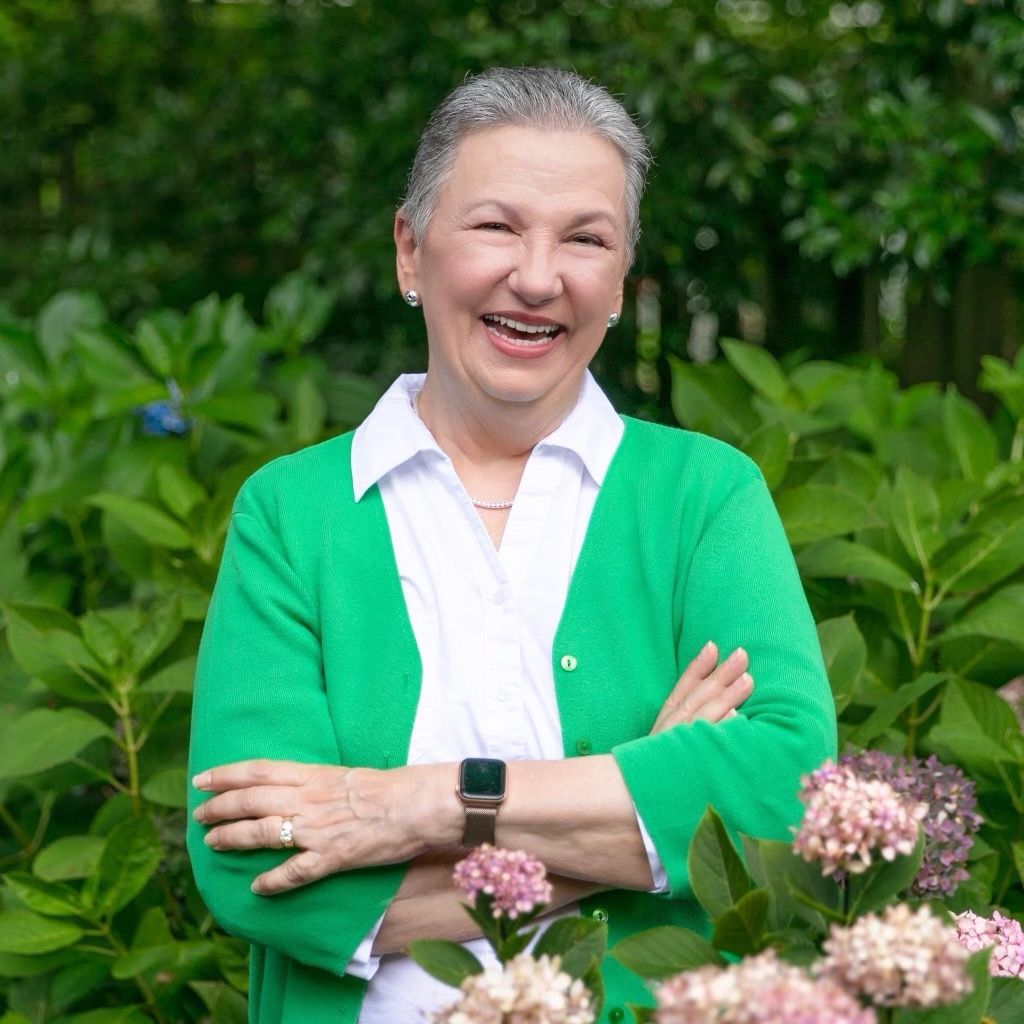
He recalls telling Debbie, who was always at the helm of their projects, that she was an artist, painting with landscape, hardscape and texture. She had responded, “I’m glad you see that.”
Grandiose memorial suggestions from well-meaning constituents, like naming the bridge or City Hall after Debbie, did not appeal to Mayor Mason. He doesn’t feel they’d accurately capture her essence. The City of Peachtree Corners will soon announce what is yet to blossom in the first lady’s memory.
In the meantime, Mason actively seeks healing through group counseling at the YMCA and reading books like Alan D. Wolfelt’s, “Healing a Spouse’s Grieving Heart.” He has graciously agreed to share some personal anecdotes in hopes of helping others.
Work through it
In moments when tears cannot be contained, Mason has learned to embrace the process of grieving. After gardening, you might find him tearfully sipping wine, reminiscing about how he and Debbie once delighted in that effort together.
Hearing a country western song while driving may require him to pull over. Listening to artists that Debbie loved from his vinyl collection, like Linda Ronstadt, cues the waterworks.
YMCA Grief counselor, Elli Garrett, sagely advised him, “You can’t stop listening to the music you love. You’ve got to work through the grief, keep experiencing life the way you and your partner did. Right now, those thoughts make you cry, but eventually listening to those songs will make you feel better because they remind you of her. You have to work through the grief to get to that point.”
Attempting to recover from the jolt of facing life devoid of the emotional intimacy he once enjoyed with his best friend, Mason repeats the mantra, “work through it,” as he continues.
“Move on means you’re trying to leave something behind. That’s the wrong approach. You have to continue. Ask yourself,‘What’s next?’ and plan it,” Mason said.
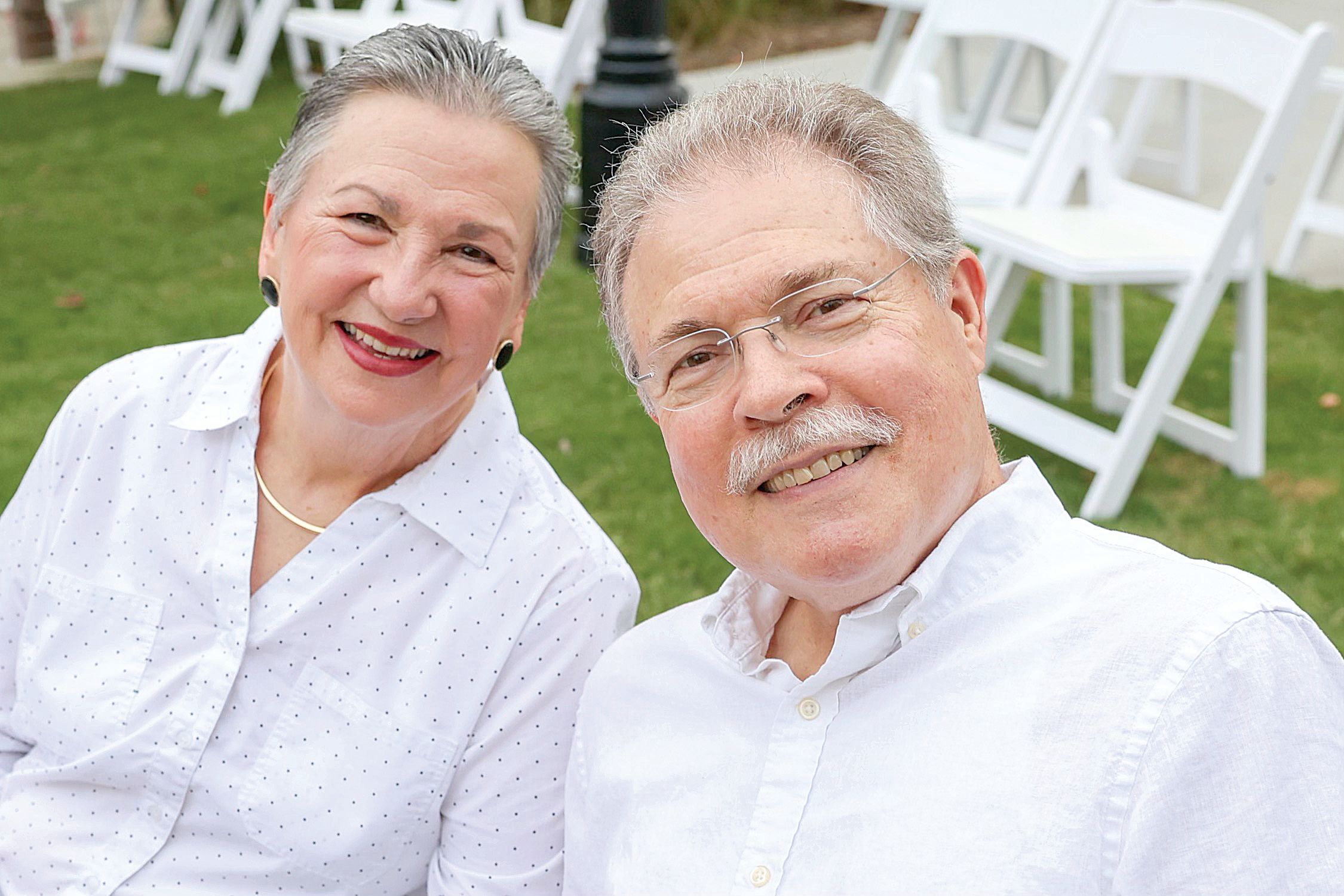
Mission impossible
Though wanting desperately to change Debbie’s circumstances, her illness was complicated by side effects and a stroke. Based on his research, the plan was to get her into remission and have five more years of seeing her smile, holding hands, flirting, snuggling and the daily tête-à-têtes with the partner he had built a life with as they worked together to create the City of Peachtree Corners.
“Nobody’s kidding themselves. There wouldn’t be a city without Debbie Mason,” he stated.
He had remained laser focused on being a cheerleader and would’ve done so forever if it would keep her alive. But two years after her diagnosis, Debbie was gone, leaving Mason to feel like he had somehow failed.
“My mission was gone. That’s a loss, too. Taking care of her didn’t work. Now I have to do what she told me several times towards the end: start thinking of the future,” he recounted.
Unable to think of life beyond Debbie until there was no choice, Mason abruptly met with solitude. “You wake up after the funeral, after everybody has gone back to their homes, and it’s just you and the house. All of a sudden, the house is quiet, the bed is empty,” he shared.
Facing the new normal is physically and emotionally exerting. As Edwards informed me, there’s no white knuckling someone’s passing, it doesn’t go away.
“Make room for the grief. Tend to it,” she said. And the mayor is doing just that.
Late night visits from the past
For Mason, the most difficult part of grieving has been the sleepless nights.
“Grief is insomnia,” he said. “Your mind won’t stop. You can be very sleepy, lay down and then, all of a sudden, you wake up and it’s that never-ending woulda, shoulda, coulda. It doesn’t matter that you intellectually understand [you shouldn’t do this]. You have to reason with yourself at two in the morning.”
Tormented by things he wishes he had done differently, Mason reviews past incidents. “People change. You’re not the same person now as you were when you first married. That’s where my mind goes — how I would’ve handled things as the man I am now,” he said.
Recognizing one should only learn from the past — it’s futile to beat yourself up about it — he endeavors to focus on today and tomorrow. “You can’t change it. Forgive yourself. Don’t make those mistakes again. Relentlessly remind yourself of that,” he said.
On a lighter note, one that couples can appreciate, the mayor realizes that if Debbie were aware of what he’s wracking his brain over today, she’d probably laugh and remind him of incidents he hasn’t even thought of yet.
Being a caregiver will change you
The difficulty of providing the most intimate care while watching a loved one as they’re ravaged by an unstoppable disease leaves a mark. Supporting the emotional and physical needs of a spouse at their most vulnerable, as they become forcibly dependent due to sickness and approaching death, imposes a disarming honesty and frankness.
“You will not be the same person. I don’t have much of a filter anymore. It’s not normal for a politician,” Mason said.
Forced to slow down while providing end of life care, the mayor has also noticed a change in his formerly fast-paced, herky-jerky ways. Now he adopts more of an unhurried disposition.
According to Edwards, some may wish to return to the person they were before the loss. But loss becomes part of your journey, and it does change you. The only question should be, “What does moving forward look like?”
“I love you in spite of, not especially because.”
It’s a family saying, or “Debbieism,” used in times of disagreement when the late first lady reprimanded their sons about things she may not have approved of. “‘I love you in spite of, not especially because.’ The three of us were outmatched by her,” the mayor reminisced.
Masons’ sons had markedly different reactions to the loss of their mother, in keeping with their own temperaments and individual bonds with her.
The eldest, Matt, spoke to Debbie before she passed and came out saying, “We’re OK.” He had become skilled at speaking to his mother in his best “help desk voice” whether assisting her with technology or resolving any differences.
Nick, however, had a more confrontational approach growing up. “He and Debbie could really push each other’s buttons,” Mason shared. Cancer didn’t leave much time for reconciliation. Though Nick is content with how things concluded, any residual burdens will be discussed with a therapist.
We’ve been friends through rain or shine for such a long, long time – Gordon Lightfoot
Remembering how Debbie left this world provides some comfort. “It ended well,” the mayor said. He stopped everything for two and a half years to focus first on saving her, and then on taking care of her.
“She knew I loved her, and it ended that way,” Mason said. He had given her a dose of morphine for the pain and helped her to relax with her favorite, a soothing foot rub.
“I touched her as gently as I could and said, ‘There you are sweetie, a good foot rub. Nothing like that to make a girl take a nap.’ She took a deep breath and let out a long sigh. That’s how she passed. It was a moment of love,” he said. “You do the best you can for as long as you can and then you continue.”
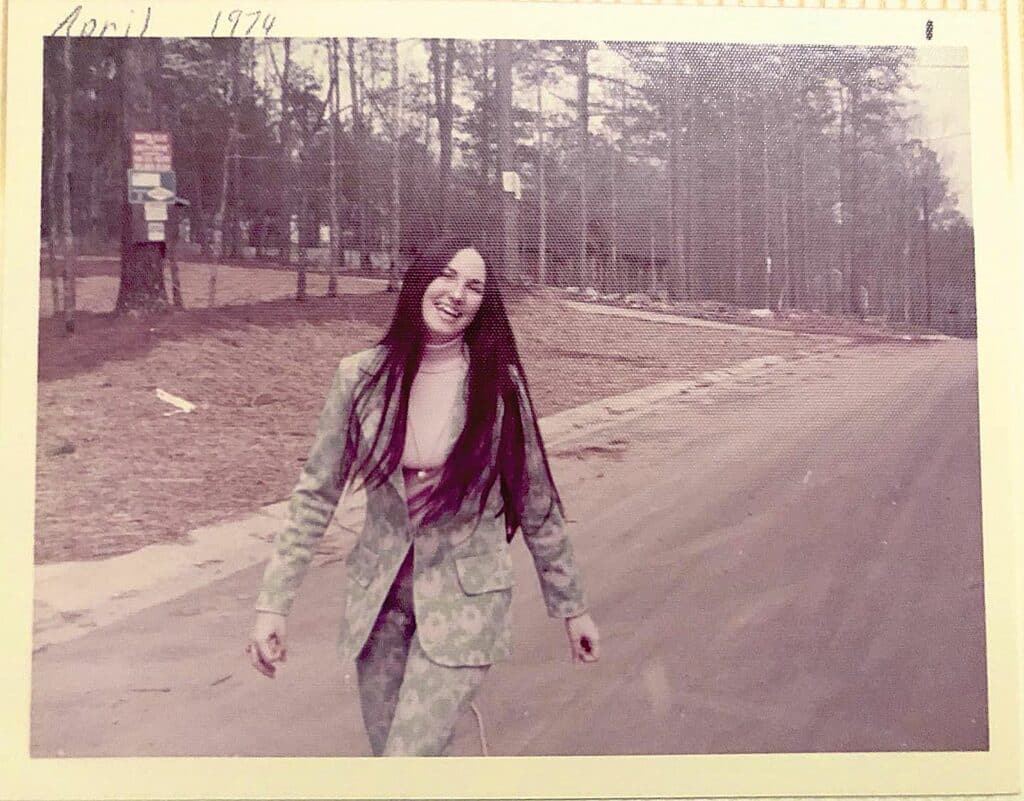
The Mason jar gets bigger
Edwards shared an uplifting visual. Picture a series of three Mason jars, each with a black ball of grief inside. The grief appears to get smaller from left to right, but in truth, it is the Mason jars that are getting progressively larger.
“People think grief will get smaller and smaller. But we grow around our grief. The jars get larger. Grief remains; we change and grow around it,” Edwards said.
Physical separation is difficult but personal growth still occurs after losing someone we love. There will be enjoyment again.
Edwards suggests releasing any guilt you may feel for having joyful moments because the deceased can’t share them with you. Embrace new people and new challenges. Do the things you’ve always enjoyed.
Developing new social contacts and having new experiences is allowing for Mason to slowly grow around his grief, like the Mason jar imagery.
He found this message communicated to him by Pastor Lori Osborn at Mount Carmel Church, to be most helpful. “The reason why, right now, talking to your friends is so hurtful, your grief is so profound, is that you live in a world where all your friends knew Debbie. Keep meeting new people so the size of your group of friends expands to include people who didn’t know her — you won’t leave them crying. Don’t be afraid to do new things,” Mason recounted.
When asked for any advice he’d like to share with mourners, he replied, “Get up every morning and try to do just that, but be kind to yourself. If you had planned to do something and suddenly you don’t want to, change the plan. Do the stuff you loved before.”
As for the mayor, he’s benefitted from a return to listening to music, perusing bookstores and reading. He is determined to keep his set point at happy and positive. It’s no easy task for the man who had tissues at the ready when he teared up during our interview.
“You get a little battered, bruised, but have to stand up and regain your balance. You can’t be a good partner if you’re too dependent upon the other person, but you do connect and lean on each other,” he said.
Feeling esteem for our city leader who so dearly loved his wife, it is my most sincere wish that when he’s ready, Mayor Mason will find a new partner with whom to create traditions and make memories, just as his departed wife had wished for him.
Caroline Manning
Caroline Manning lost her husband of 42 years in 2018. Thoroughly entrenched in the community, when he wasn’t at his law firm, John coached baseball and played tennis. He was the first Chairman of the Board at the Robert Fowler YMCA where he served on multiple committees thereafter.
He also hosted the Good Friday breakfast for thousands of people and delivered sermons to the children at Simpsonwood United Methodist Church every Sunday for 30 years. Needless to say, John was a busy man.
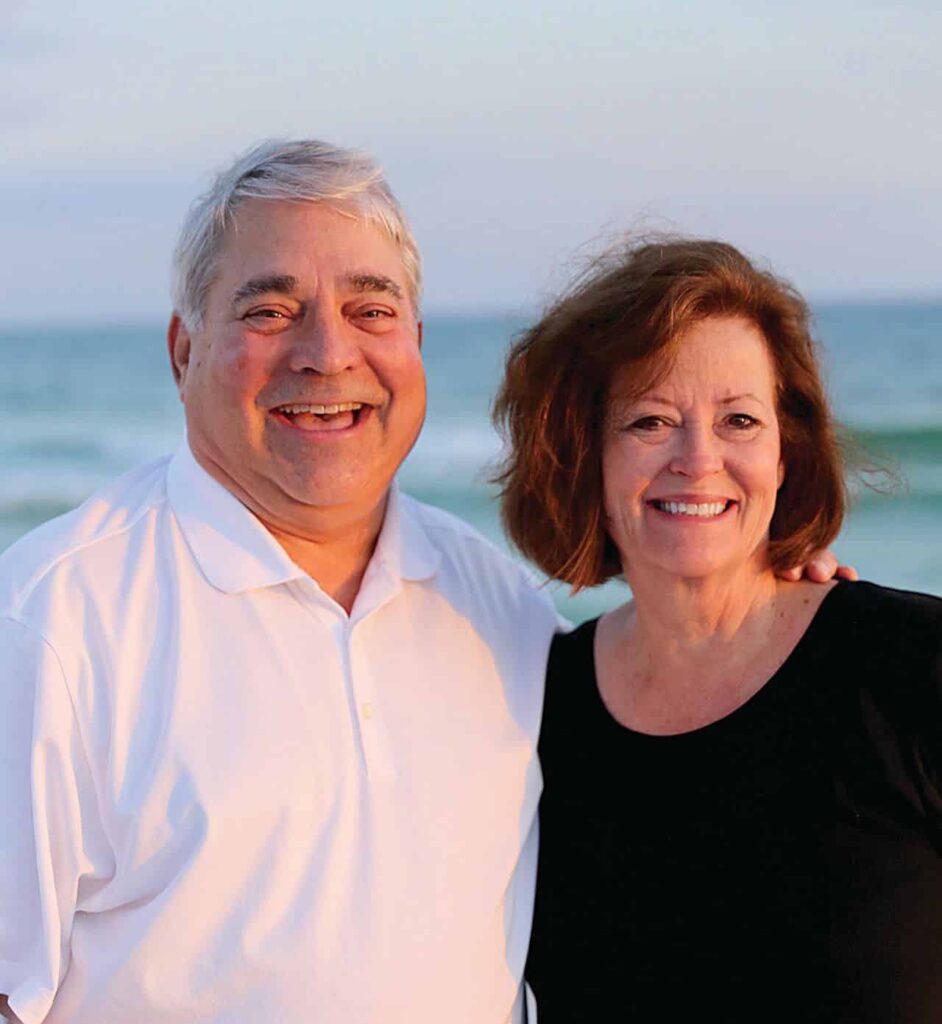
He died as he lived, assisting others. He was having fun with dear friends while helping a parishioner who had been evicted. They were boxing and transporting her belongings to an apartment on a hot September day. John, who had lived with Type 2 diabetes for 25 years, was seen jovially directing traffic. No one noticed he was declining.
In addition to taking insulin to keep blood sugar levels steady, diabetics must also remain vigilant and eat at certain times. Thinking he’d be home by noon, John had overextended himself in the warm weather, likely fueled only by a donut breakfast with his church group.
Probably feeling shaky by 2:00 in the afternoon as his blood sugar plummeted, he announced he was going to get something to eat.
“He was too busy to pay attention. He knew how to deal with it but would get so wrapped up in whatever project he was involved in. I would say, ‘John, you’re a grown man. If you feel bad, you need to stop and get something to eat.’ This was before FreeStyle Libre that checks your blood sugar and keeps you posted,” Caroline said.
At home preparing to receive guests, Caroline was contacted by a Duluth policeman with news that John had gone to Burger King, choked and passed out. Someone performed the Heimlich maneuver and John was rushed to Joan Glancy Memorial Hospital.
She was told to get to the hospital immediately.
The unexpected
Upon arrival, the receptionist sent her to a room. When a grief counselor introduced herself, Caroline thought she must have the wrong person.
Then the doctor came in and abruptly delivered the message, “I’m sorry to tell you this, Mrs. Manning, but your husband has passed away.” The choking had caused a heart attack. John was 70.
Caroline alerted the church that John wouldn’t be giving the Sunday sermon. She and her daughter Catherine fielded a barrage of questions as doctors sought to determine the cause of death. Her eldest, Sarah Frances, rushed home from Hilton Head.
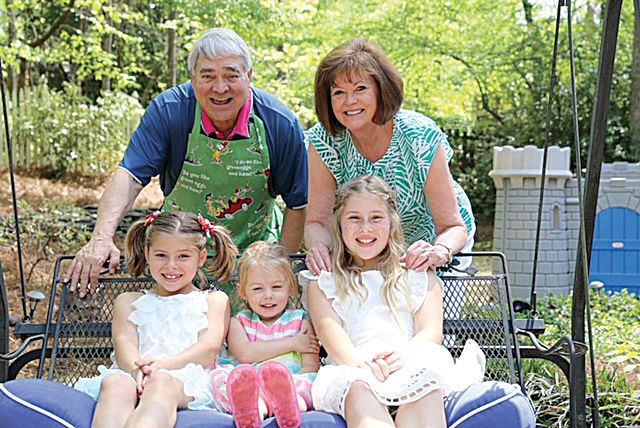
Anticipatory grief
Edwards explained anticipatory grief. If you can see it coming, whether it’s a terminal illness, an addiction, a loved one’s behavior that could cause their demise, grieving begins while the person is still alive.
“When you fear you’re losing this person, in the back of your mind you know unless something changes, this is likely going to end in their death, you’re already grieving,” Edwards said.
Those suffering anticipatory grief may wonder why they’re not more sorrowful once the individual passes away. “I ask clients to tell me about before. Before was full of so much grief or worry. Afterwards, it’s almost like a sigh of relief. Grief is more than sadness,” Edwards said.
After the initial shock, Caroline experienced a sense of calm. It was the end of her distress every time John left the house. She no longer had to worry about him living on the edge. It may seem unusual to those unfamiliar with this phenomenon, but it is indeed, part of grief.
She and her daughters had witnessed more of John’s risky behavior and cautioned him repeatedly.
Wishing he’d had FreeStyle Libre to beep at him, Caroline shared, “We worried constantly. He’d stay too long at the office or go to a meeting and not eat. By the time he’d get home, he’d be shaking and sweating. We’d get mad.”
Fearing the worst, Caroline insisted on moving his office from Buckhead back to Peachtree Corners; John was having episodes of feeling light-headed driving home.
She had asked him, just months before he passed, what his wishes would be for his funeral. She knew he’d have specific requests for songs and Bible verses, and she noted those.
Losing a patriarch
John’s departure was swift. “Because we didn’t see any suffering, what we had to do is learn to live without him,” Caroline said.
She was at ease assuming the role of hostess. “People were coming over. I was explaining what had happened and making everyone feel comfortable,” she said.
Sarah Frances, who worked in public relations at the time, kicked into PR mode. She wrote the obituary, planned the funeral, created the program and contacted everyone. She was in full-blown funeral mode.
“That’s how Sara Frances handled her grief. She wanted it to be the most perfect funeral, if there is such a thing,” Caroline said.
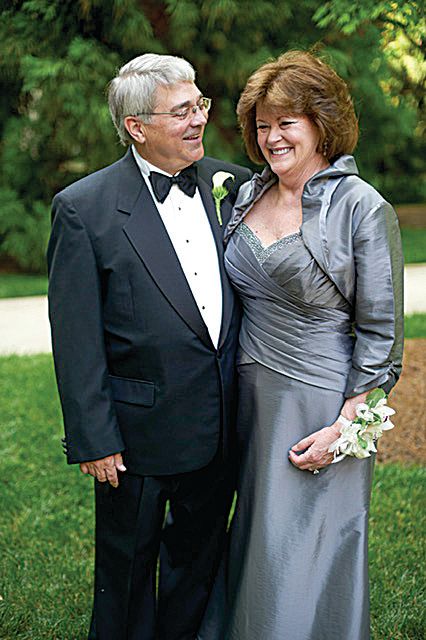
Diabetes can kill you
Stressing the seriousness of diabetes — a disease that can unexpectedly kill you — Sarah Frances also contributed to a cautionary article for a legal publication. The response was surprising. Caroline heard from several attorneys with Type 2 diabetes who never thought they could die from it.
The family was stunned by comments like, “I’d just get a Coke and a candy bar to bring my blood sugar levels up,” Caroline said.
Wives reached out declaring they had never fretted, having no idea this could happen. “I don’t know what doctors are doing wrong. People think they can eat and do whatever they want, as long as they’re taking meds. So much to learn,” Caroline sighed.
Count your blessings
John’s doctor provided some consolation, pointing out that he could’ve gone into a coma. “I firmly believe God took him quickly as opposed to letting him stay in a coma. He would not have liked to have a debilitating disease. He died the way he would’ve wanted — doing what he loved with people he loved — and not in bed, sick,” Caroline said.
“He was never sick. He never missed church or work. I think we’d all hope to die like that — quickly, no suffering, no putting your family through struggles. I count that as a blessing,” she added.
No time for a meltdown
Fraught with projects, there was no time to stop. It was likely self-preservation that had her functioning on autopilot. “I didn’t have a real meltdown,” Caroline said.
She’d been suggesting they downsize and encouraging John to either close his office or work from home for years. Not wanting the task of maintaining their family home alone, Caroline was quick to get it on the market.
She also closed down John’s law firm. It was a daunting undertaking; he had practiced for over 40 years.
Just days prior to his passing away, the couple had started cleaning out their basement — a job she was left to complete on her own.
Same loss, different grief
“I had all those projects lined up. I was consumed with all that. I think the girls have struggled more than I have. They were both very close to their dad,” Caroline said.
Each of the Mannings’ daughters would tell you they were John’s favorite. Sarah Frances, who inherited John’s exuberant personality, sought grief counseling.
Advice
Selecting Crowell Brothers Funeral Home on Peachtree Industrial Boulevard proved to be beneficial. “They were wonderful to work with. They handled everything,” Caroline said.
They fought for three months to obtain the certificate of death without which one cannot sell property or collect life insurance. They remained in constant contact with Caroline, who deems them “fabulous.”
According to Caroline, grief must be processed one step at a time. She has moved from one step to the next with the help of her girls and her grand-girls, who are a huge part of her life.
Decisions, decisions
The hardest thing for Caroline was facing choices alone. She was glad to have the support of her daughters.
“When you’ve been married for 42 years, the hardest thing is making a decision by myself,” Caroline revealed.
Without an equal partner to help weigh ideas, she realized that whatever happened going forward, was going to be her call. It was daunting at first, but now she’s more comfortable with it.
“I’m loving being in charge,” she chuckled.
The company of a man
When Caroline and John were together, the couple enjoyed mutual respect and a lot of fun. They loved cooking and entertaining, music and theatre.
Caroline misses his humor, companionship and the fun surprises he’d plan, like scavenger hunts and progressive dinners spanning multiple restaurants.
“John liked to go and do,” Caroline smiled. “Not having any men in my life has been challenging. They do bring a lot. I’m only now reaching that point.”
New life
“I feel like I am where I’m supposed to be,” Caroline shared.
She’s moved to a home she loves in a conveniently located neighborhood of both young families and empty nesters. “It’s a nice mix. A great group of people. The women get together for happy hour at the pool,” she said.
Embracing a new career, Caroline adores substitute teaching at her granddaughters’ school. They bring their friends by to meet their “Mimi.”
Caroline is ready for the next chapter in her life.
Bottom line
Tomorrow is not promised to anyone. Tell your people how much you love them often and treasure the special moments you are able to share with them.
Part 2 of Life After Loss is scheduled to appear in the next issue of Peachtree Corners Magazine.
For a therapist who will meet you wherever you are on your grief journey, contact Edwards at 470-668-5930 or email info@edwardspac.com.
Related
-
-
-
-
-
John and Caroline Manning
-
John and Caroline Manning with their grandchildren
-
John and Caroline Manning enjoying a special occasion together
-
Debbie and Mike Mason
Patrizia hails from Toronto, Canada where she earned an Honors B.A. in French and Italian studies at York University, and a B.Ed. at the University of Toronto. This trilingual former French teacher has called Georgia home since 1998. She and her family have enjoyed living, working and playing in Peachtree Corners since 2013.

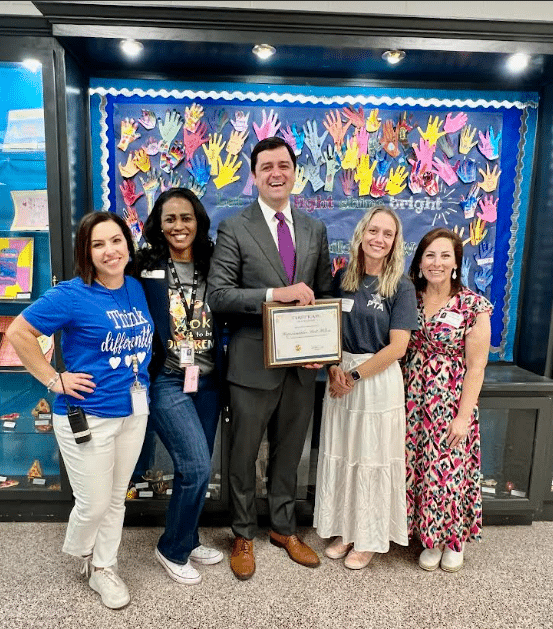
Simpson Elementary School celebrated Exceptional Children’s Week (ECW) last month with five days of special activities to recognize their special needs population and all of their exceptional students.
April 14–18 is set aside each year to celebrate children with disabilities, gifts and talents. This year’s ECW theme was Bridging Gaps and Building Futures, and the school was happy to take part.
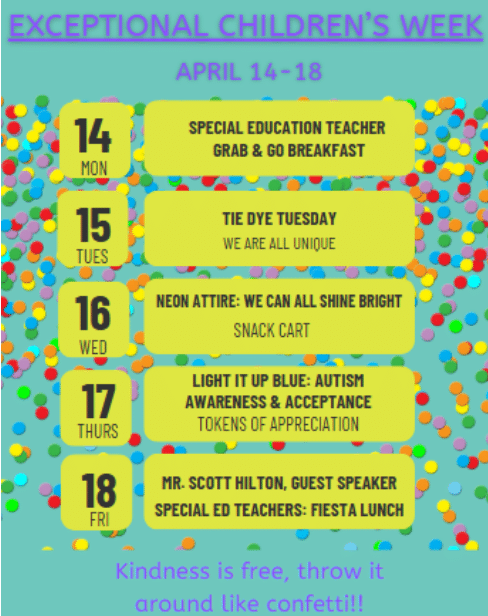
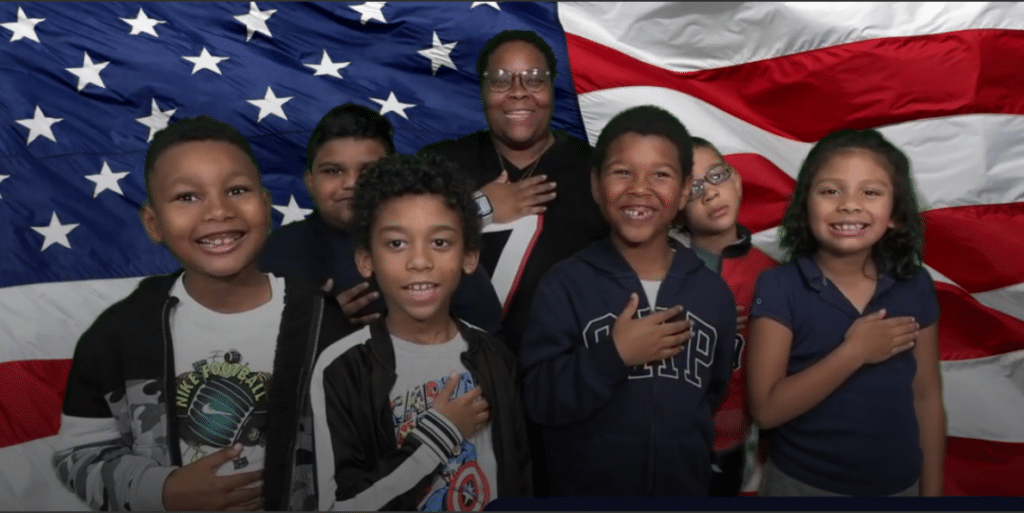
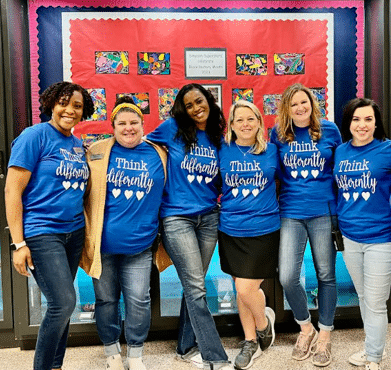
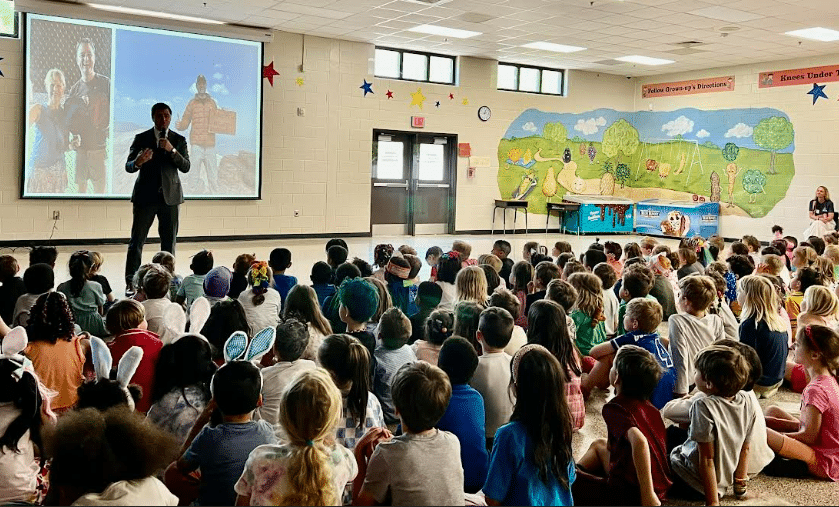
They highlighted each day of the week on the morning news with fun facts about notable people in society — and throughout history — who have overcome challenges with their disabilities, including actor Daniel Radcliffe (who has lived with dyspraxia for his entire life), Tom Cruise, Whoopi Goldberg, Frida Kahlo and Helen Keller.
Simpson Elementary’s technology team also pre-recorded various special needs classes reciting the Pledge of Allegiance every day of the week.
Guest speaker
To end their ECW with a bang, they invited former Simpson Elementary parent, State Representative Scott Hilton, to come in and speak to their K-2 classes about raising his son, Chase (who is autistic and now a student at Norcross High School), and how being different is okay.
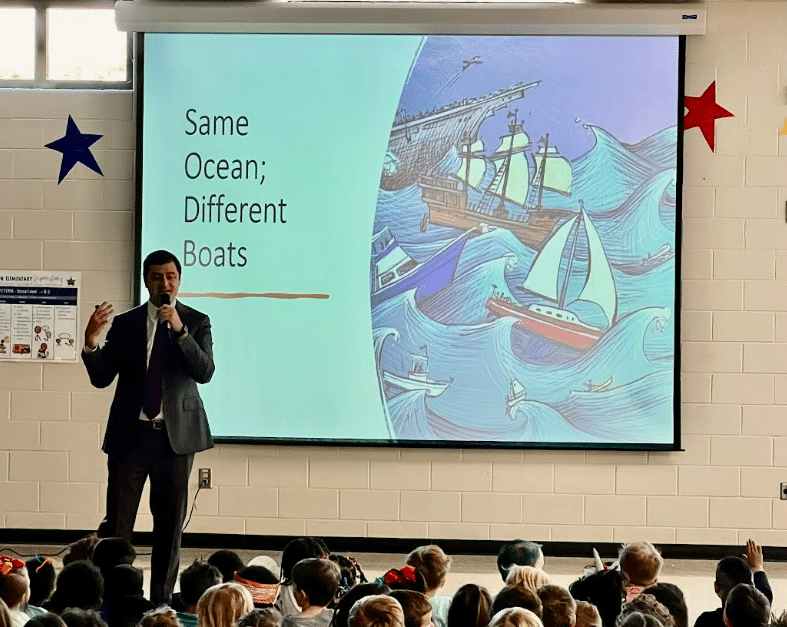
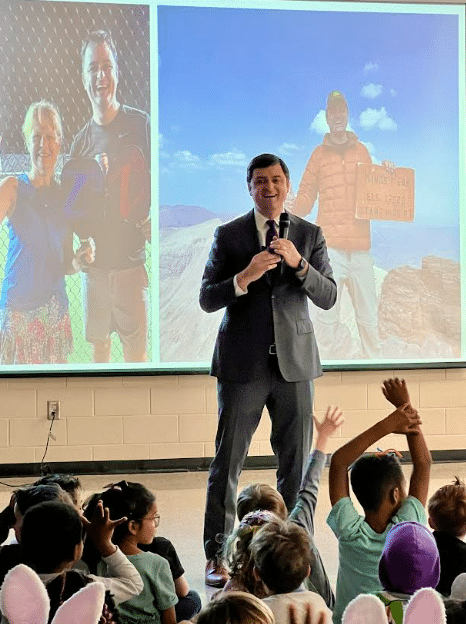
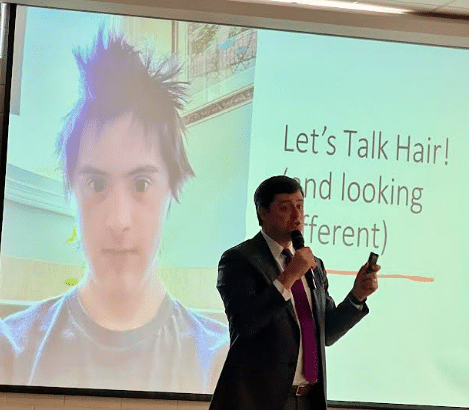
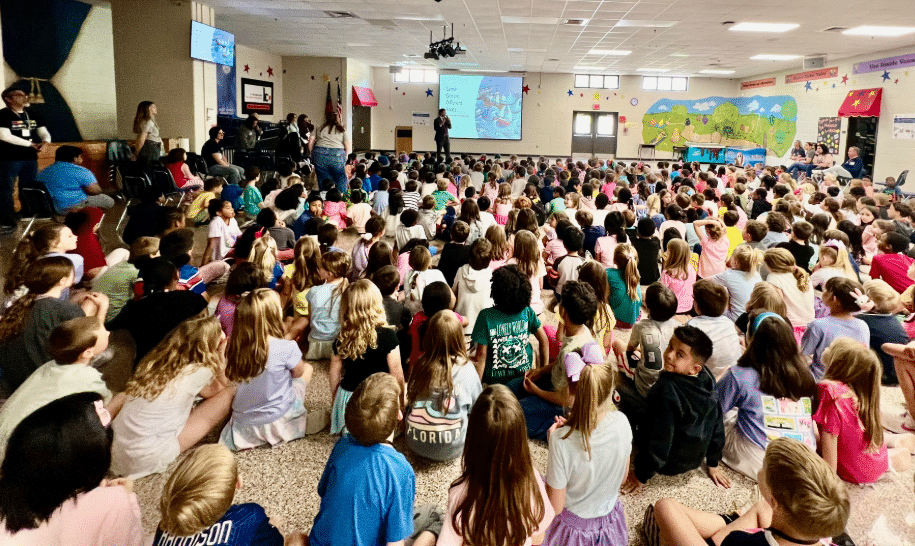
“Showing kindness and being inclusive is the best version of humanity,” said Dr. Taffeta Connery, Simpson Elementary School principal, in a statement about the event.
“Simpson Elementary has a special needs population of 214 (23%) of 946 students. [And] … we strive to ensure that our students are valued, recognized and instilled with high expectations for all.”
For more about Simpson Elementary, visit simpsones.gcpsk12.org.
Related
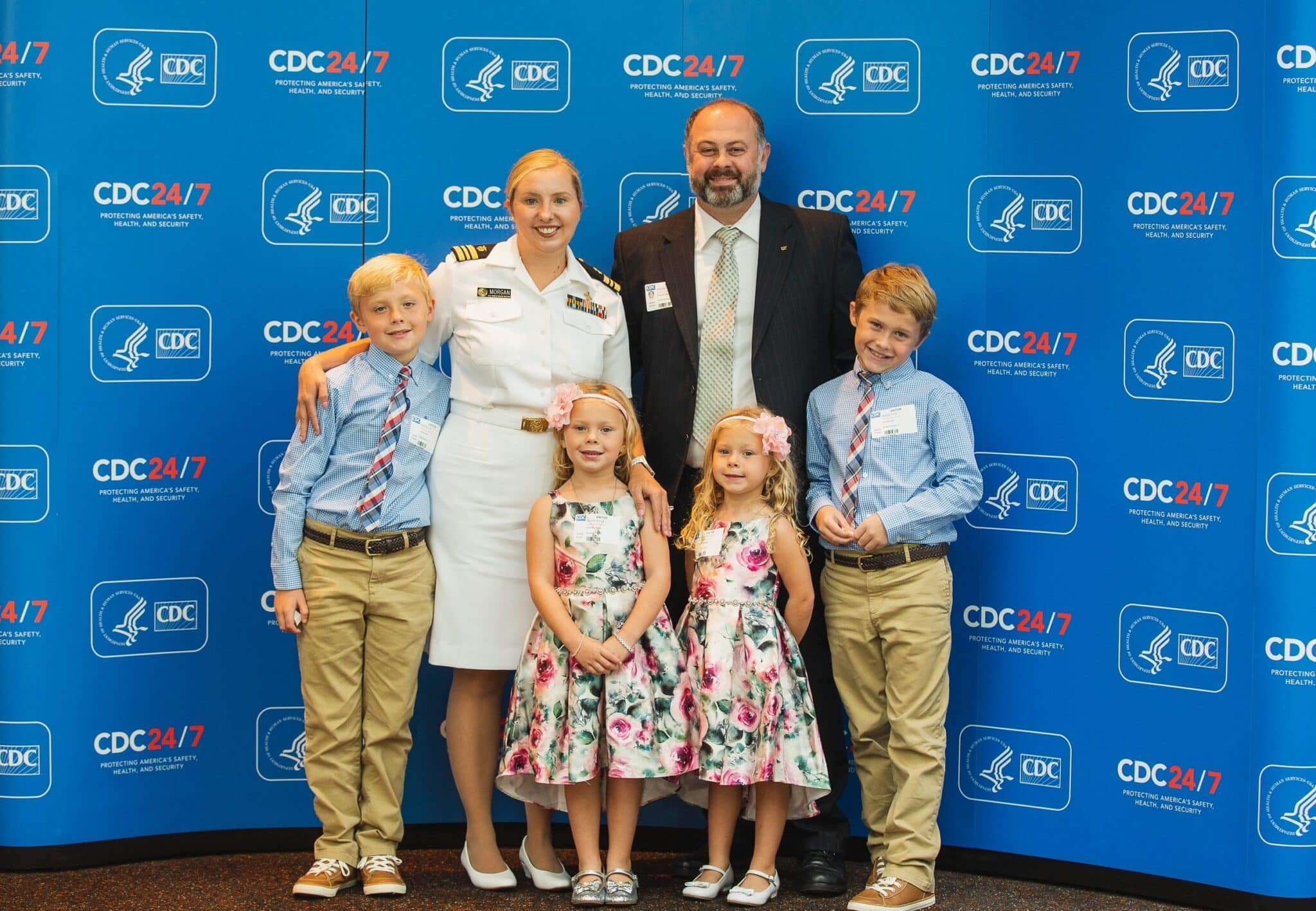
Motherhood comes with a lot of moving parts. For these Peachtree Corners moms, it also means leading teams, building careers and keeping the family schedule running. Most days, all at once.
This Mother’s Day, we’re spotlighting seven women in our community who are doing just that. They’re professionals in full-time leadership roles, showing up to strategy meetings by day and soccer games by night. They’re problem-solvers, planners, caregivers and coaches.
What connects them most isn’t just what they do, it’s how they do it. With intention. With humor. With support from partners, parents, friends and neighbors. And with a deep appreciation for the community they’ve built in Peachtree Corners.
Through their stories, we celebrate more than titles and to-do lists. We honor the quiet, constant work of showing up.
Tracy Lee
Tracy Lee leads with heart and vision as CEO of This Dot Labs, a software consultancy focused on helping businesses solve complex challenges through technology. Her engineering leaders collaborate with major clients like Stripe, DocuSign, Google, Wikipedia and Roblox. She’s passionate about her work.
“I love the mix of problem-solving and people leadership and knowing the work we do can make a real-world impact,” she said.
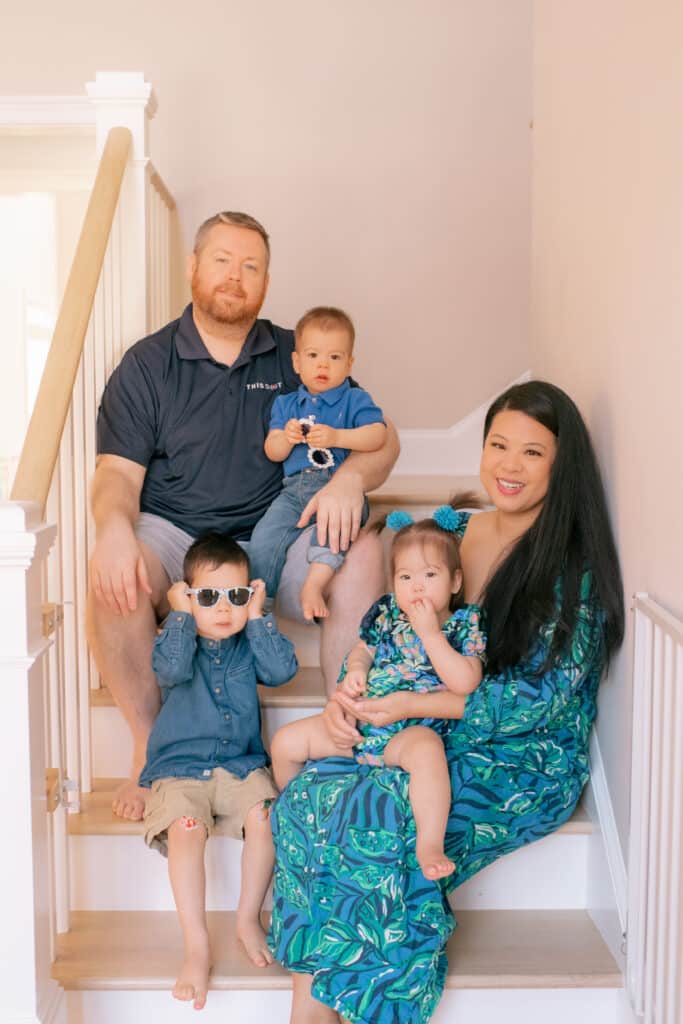
Tracy brings that same intentionality to her life at home, where she and her husband, Elliott Fouts, are raising three young children: William, 3, and twins Angelina and Marcus, who are 1.5. Despite the busy pace, Tracy is committed to being present in every role she plays.
“I have three full-time nannies and two part-time nannies, as well as girls around the neighborhood who are mama’s helpers to manage the chaos! With the help, we are able to do more and enjoy more time with our kids,” she said. “I try to be fully present, whether I’m in a meeting or building block towers in the living room. It’s never perfect, but we focus on what matters most in the moment.”
Tracy credits her support system for making it all possible. “I have an incredible partner and a strong support system between our nannies, friends and local community,” she said. “We have a local moms group for Asian moms called Georgia Asian Moms, and there are so many moms just in our neighborhood. It’s really great.”
Peachtree Corners has become a meaningful home base for the family. “We absolutely love it here,” she said. “There’s amazing programming for kids at The Forum every Tuesday in the spring and summer. It’s such a gem for young families.”
Weekends often include time outside and community adventures. “Sometimes the best hack is just piling everyone in the wagon and heading out for fresh air!” she said.
Tracy leans on a strong partner, a tight-knit group of friends and a local moms network. “It really takes a village,” she shared. “And I feel lucky to have one.”
Melissa Nicholson
Melissa Nicholson knows what it means to lead with heart and precision. As division vice president of program management & international solutions at Aya Healthcare, she helps internationally educated healthcare professionals enter the U.S. workforce.
“What I enjoy most is the opportunity to support these professionals in achieving their American dream,” she said. “While also contributing to improved patient outcomes across the country.”
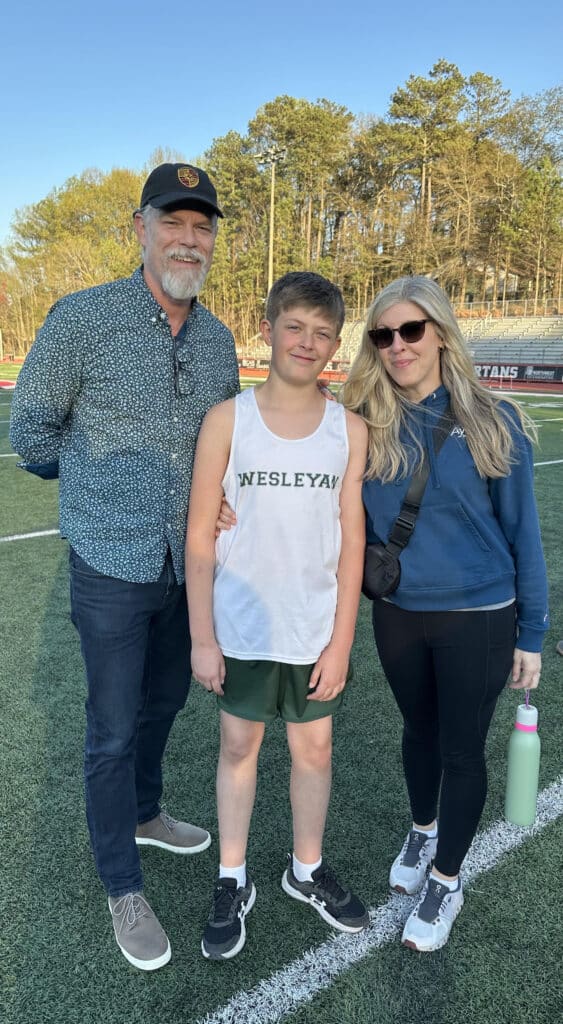
Melissa and her husband Greg recently celebrated 15 years of marriage. Their 12-year-old son, Luke, and a cat named Charlie bring a fun, loving dynamic of their own into the family. After relocating from East Atlanta a decade ago, they quickly embraced the Peachtree Corners community.
“It’s the people who make this community so special,” she said. “We’re truly grateful to count our neighbors as friends.”
Balancing an executive role with family life takes clarity and commitment. “I have to be very intentional with my time,” Melissa shared. She sets boundaries at work and makes sure her team knows when she’s off the clock for important family moments.
Wellness is a key part of her rhythm. “I recently started working out at Orangetheory Fitness,” she said. “I’ve noticed a significant boost in both energy and focus.” Sundays are for church and reflection.
When she travels for work, Greg holds it down at home. “We rely on each other to keep life running smoothly,” she said. “I’m grateful every day for that kind of partnership.”
On weekends, Melissa prioritizes quality time. Whether that’s a hike, pool day or baking something from scratch. “We’ve learned that if we don’t prioritize those moments, the weekends can quickly get taken over.”
Diva Hicks
For Diva Hicks, work isn’t just a job, it’s personal. As creative senior manager at CURE Childhood Cancer, her mission runs deep.
“At 12 years old, my sister was diagnosed with cancer,” she said. “CURE, in its early days, was a resource for my family.”

Her sister survived and now thrives. That experience shaped Diva’s career and continues to inspire her today. “This is my opportunity to give back to CURE for what it did for my family,” she said. “It’s rare to find a place where your purpose and passions collide.”
CURE also welcomes her whole family into the fold. “I get to bring my kids to events all the time,” she said. “They love feeling like they are a part of my work.”
Diva lives in Peachtree Corners with her husband John, their children Adair, 8, and Tripp, 6, and two golden doodles. “There is a sense of community here that I think is special,” she said.
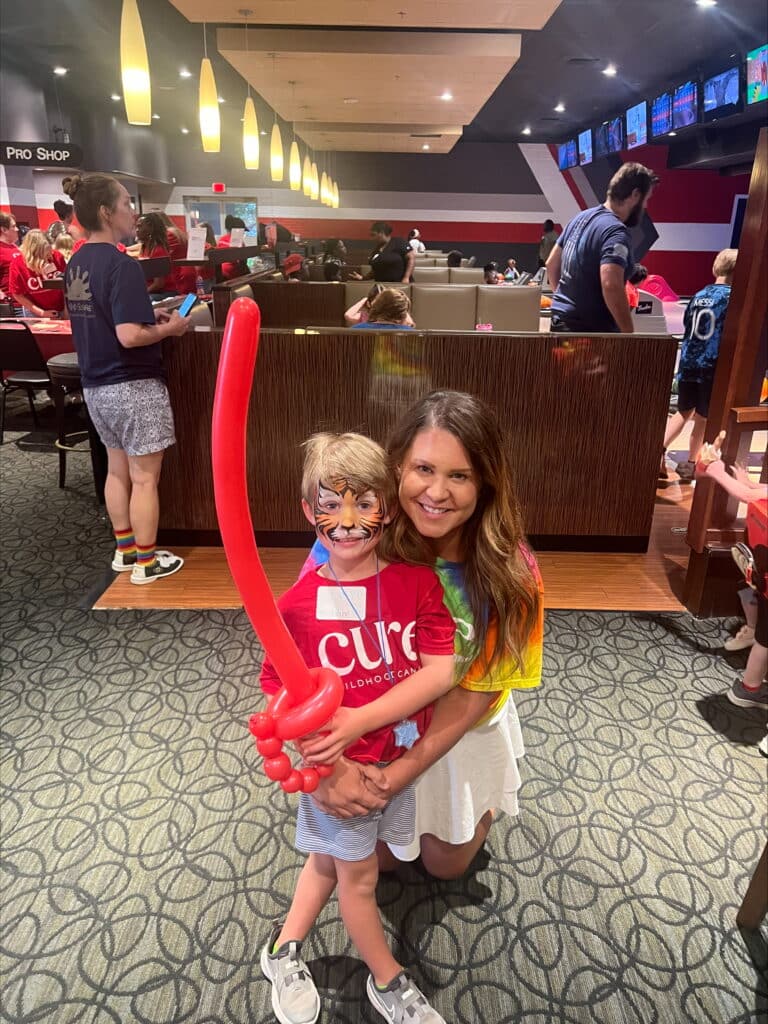
Balance is a daily effort. “John and I have tackled who helps with homework and on what days,” she said. “I would not be able to be the mom that I am without my village.”
She leads school committees and never misses events. “Is it easy? No,” she said. “But I honestly say, it’s not easy for any parent.”
Diva’s motivation is clear. “I want Adair to look at me and see that she can be a mom and have a career too.”
The family stays grounded with tennis weekends and careful planning. “We live by our calendar,” she said. “The more prepared I am, the easier life is.”
Kate Martin
Kate Martin knows how to bring structure to busy systems. As senior director of financial planning and analysis at Alloy Roofing, she finds energy in collaboration and clear strategy.
“In this role, I work closely with various teams across the business,” she said. “It supports the company’s strategy and performance.”
Kate and her husband, Nathan, are raising two children, 14-year-old Elliot and 10-year-old Evan, in Peachtree Corners. After ten years in the area, she credits the people for making it feel like home. “Life wouldn’t be the same without the relationships we’ve built here,” she said.
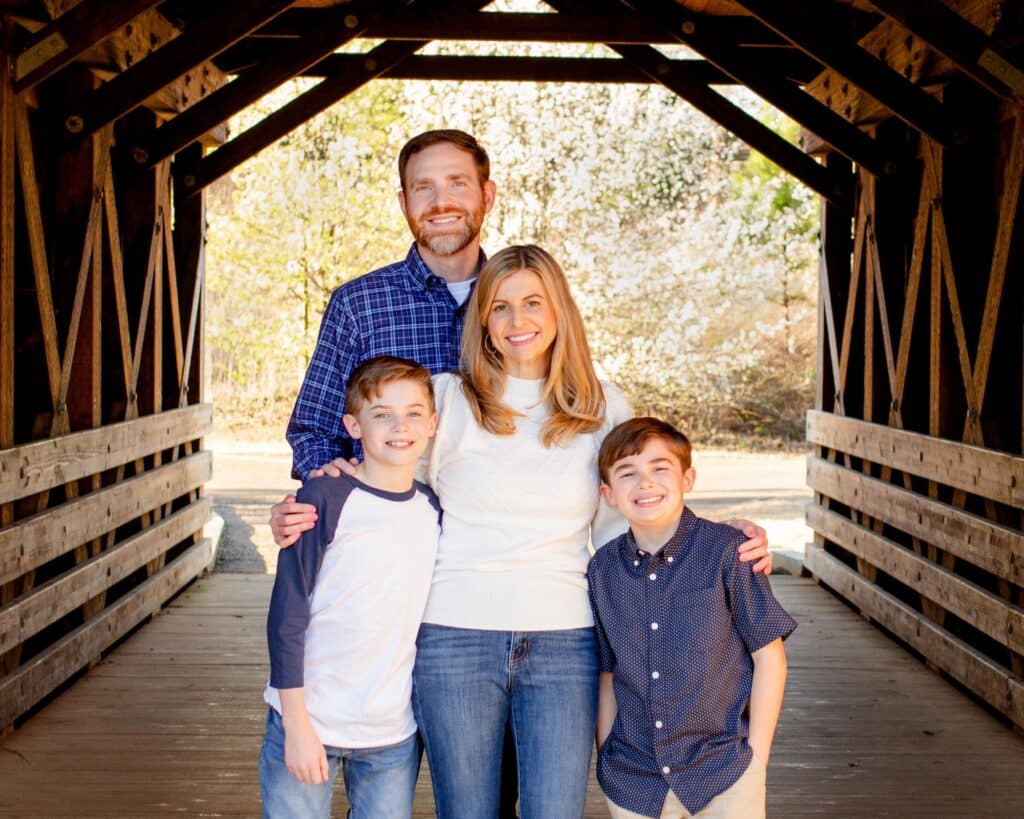
Balance starts with planning. “We keep a central Google calendar synced with all the family commitments that we review daily,” she said. “On Sundays we write on the kitchen boards.” Their chalkboard becomes the weekly roadmap, from meals to responsibilities.
“Seeing things laid out visually keeps me from overcommitting,” she added.
The family stays grounded by recognizing progress. “What keeps me motivated is celebrating both the big and small wins together,” she shared. “Sometimes, making it through the week is a victory in itself.”
Kate relies on a strong network. “We are very fortunate to have my parents nearby,” she said. “I also have an amazing network of women here in Peachtree Corners that I rely on.”
Her favorite hack? “An app Nathan created to help manage our calendars,” she said. “He created a solution to integrate these webcal subscriptions into a central subscription hub.” It’s called Skedj, and they’re piloting it now. “If you know this struggle and want to help us pilot the app, check out skedj.co!”
Linda Luna
As vice president at RSUI, Linda Luna manages risk while empowering people. She leads a team of underwriters who handle professional liability and cyber insurance. “I really enjoy my job because of its dynamic nature and the opportunity to help people in meaningful ways,” she said.
Whether she’s mentoring her team or protecting clients’ businesses, Linda finds value in impact. “It’s rewarding to know that my work has a positive impact on both my colleagues and our clients.”

She and her husband, Ruben, are raising their two children, Dawson, 10, and Ava, 6, in Peachtree Corners. Her parents, though not under the same roof, are a constant part of daily life. “They help keep things running smoothly on the home front,” she said.
After nine years in the community, Linda has grown to love its blend of charm and convenience. “There is always something to do,” she said. “Whether it’s grabbing a bite at Ted’s or spending time with friends at Town Center.”
Balance comes from structure. “By establishing a solid schedule and sticking to it, I can ensure that my work commitments are met,” she said. “Being fully present allows me to strengthen my connection with my loved ones.”
When things get busy, she takes a practical approach. “Breaking it down into smaller, manageable tasks makes it much more approachable,” she said. “I remind myself to keep the bigger picture in mind and not sweat the small stuff.”
Linda’s support system is strong. “It truly takes a village, and I’m so grateful for mine,” she said. The family’s favorite tradition? A beach trip to 30A every May. “It’s our way of unwinding, reconnecting and making lasting memories together.”
Allison Blasetti
Allison Blasetti holds a national leadership role at Transamerica in the employee benefits division — a position that constantly challenges and motivates her. “What I enjoy most is the opportunity to use my talents to help my team,” she said. “I’m always growing and learning.”
She and her husband, John, are raising daughters Annie Mae, 8, and Olive, 6, in Peachtree Corners, where they’ve built strong ties in the community. “The amenities in our city provide many opportunities to run into friends around town or plan meet-ups,” she said.

Allison works from home and prioritizes clear boundaries. “I turn off my app notifications because it quickly pulls me back in to work,” she said. “I also have a dedicated workspace in my house where I can leave at the end of the workday.”
She’s developed the habit of resetting her mindset, as well. “I quickly recognize [when] I’m mentally ‘at work’ and actively redirect my thoughts back to being in the present moment.”
Allison’s mornings begin at Burn Bootcamp, where she finds motivation and connection. “Spending an hour with my Burn community helps me get grounded for the day,” she said.
To stay organized, she and her husband use a shared family calendar. Her mom steps in often, especially when work travel ramps up. “I really don’t know what we would do without her.”
On weekends, Allison coaches Olive’s soccer team with the Peachtree Corners Football Club. “It brings me so much joy to be outside, see my soccer friends and watch my girls have fun,” she said. “Coaching makes it even better because I get to support the community that means a lot to me.”
Samantha Morgan
Samantha Morgan is a commander in the U.S. Public Health Service, currently assigned to the Centers for Disease Control and Prevention. Over her career, she’s responded to major public health threats, including Ebola, Zika and COVID-19. Today, her work centers on injury prevention, with a focus on issues like suicide, drowning and traumatic brain injury.
“What I enjoy most is being part of CDC’s mission to save lives and protect people,” she said. “I’m proud to contribute to work that makes a tangible difference in communities across the country.”
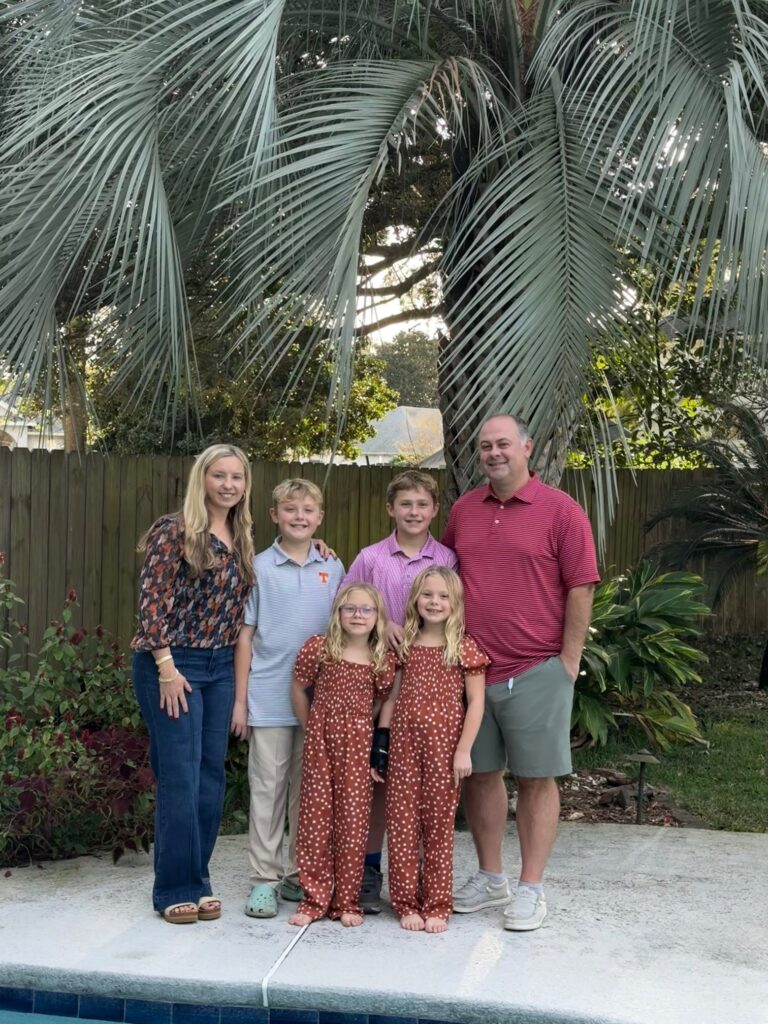
At home in Peachtree Corners, Samantha and her husband, Brian, are raising two sets of twins. Luke and Elliot are 12-years-old and love baseball, golf, basketball and band. Charlotte and Noelle are 8-years-old and enjoy piano, tumbling and tennis. “Life with four kids is wonderfully busy,” she said. “I often joke that I’m an unpaid Uber driver!”
After more than a decade in the neighborhood, Samantha credits their support system for helping them manage the day-to-day. “Our neighbors and friends — our village — have supported us through the hardest moments and celebrated life’s greatest joys with us,” she said.
Structure is key to keeping things on track. “We live and breathe by our family calendar,” she said. “Shared schedules, group texts and carpooling help us keep things running.”
Her children remain Samantha’s biggest motivators. “They know, ‘mom’s going to work to help make the world a safer place,’” she said.
The family also leans on routines and simple joys. “Checklists are my go-to mom hack,” she shared. One of their favorite traditions is make-your-own-pizza night. “It’s messy, silly and something we all genuinely look forward to.”
The seven women featured here offer a glimpse into the lives of working moms in Peachtree Corners. Each one balances career, family and community with care and intention. They are just a few of the many women — both working and stay-at-home — who nurture, organize and uplift the people around them every day.
Whether leading teams or guiding their children, mothers across this community show up with strength, love and quiet determination.
You’ll find this story in the May/June issue of Peachtree Corners Magazine, available in print and digital edition.
Related
City of Peachtree Corners
Official City Merchandise Line Debuts This Saturday at Town Green
Published
3 days agoon
May 6, 2025
This Saturday, May 10, residents and visitors are invited to experience the debut of Peachtree Corners’ official merchandise collection at the Town Green. The pop-up shop will be open all day, beginning at 8 a.m., located directly behind the former Jinbei restaurant.
This pop-up shop is provided through a pilot program with Vox-pop-uli and the City of Peachtree Corners.

“We’re thrilled to showcase our city’s spirit through this exciting new merchandise line,” said Louis Svehla, City of Peachtree Corners director of communications. “There’s something for everyone, whether you’re a proud local or just visiting. We are excited about testing this pilot program to raise funds for continued improvements at Town Green and events.”
Featured items include:
- brand new concert-themed apparel
- city-branded merchandise
- limited edition collectibles
- perfect Mother’s Day gift selections
With Mother’s Day approaching, shoppers will find unique, locally inspired gifts guaranteed to delight mom with something she doesn’t already own.

Visitors can browse and purchase items throughout the day, with friendly staff available to assist with selections.
Event details
Date: Saturday, May 10
Time: Starting at 8 a.m.
Location: Town Green (behind former Jinbei location)
Payment methods accepted: Cash and credit card accepted
Related
Read the Digital Edition
Subscribe
Keep Up With Peachtree Corners News
Join our mailing list to receive the latest news and updates from our team.
You have Successfully Subscribed!

Katherine Lafourcade — A Journey of Passion, Resilience and Giving Back

GA Tech Launches First-of-its-Kind GT Atrium in Peachtree Corners

Digital Edition

PCBA Announces 2025 Scholarship Winner

Paul Duke STEM High School Student Earns CGO Scholarship

World Blood Donor Day Starts Here: Theo’s Miracle, Katherine’s Mission [Podcast]

Official City Merchandise Line Debuts This Saturday at Town Green

Peachtree Corners Grows Business Opportunities Through Economic Development

City of Peachtree Corners Awarded Certificate of Achievement From GFOA for Seventh Straight Year

Simpson Elementary Marks Exceptional Children’s Week

Executive Function: A Tribute to Working Moms

Official City Merchandise Line Debuts This Saturday at Town Green

Peachtree Corners Grows Business Opportunities Through Economic Development

Digital Edition

World Blood Donor Day Starts Here: Theo’s Miracle, Katherine’s Mission [Podcast]

Paul Duke STEM High School Student Earns CGO Scholarship

Light up the Corners [Video]

Capitalist Sage: Business Leadership in Your Community [Podcast]

Cliff Bramble: A Culinary Adventure through Italy

Top 10 Brunch Places in Gwinnett County

A Hunger for Hospitality

THE CORNERS EPISODE 3 – BLAXICAN PART 1

Top 10 Indoor Things To Do This Winter

The ED Hour: What it takes to Remove Barriers from Education

Peachtree Corners Life
Topics and Categories
Trending
-
Digital Edition5 days ago
Digital Edition
-
Podcast5 days ago
World Blood Donor Day Starts Here: Theo’s Miracle, Katherine’s Mission [Podcast]
-
City of Peachtree Corners3 days ago
Official City Merchandise Line Debuts This Saturday at Town Green
-
Business3 days ago
Peachtree Corners Grows Business Opportunities Through Economic Development



